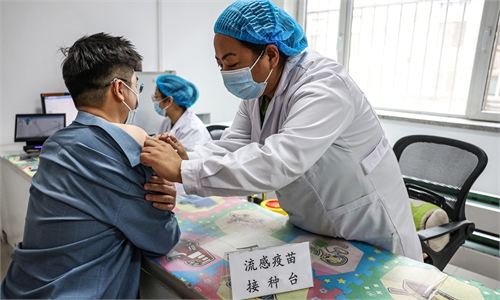China has sufficient technical expertise, public health resources to cope with the current respiratory illness spike: Zhang Wenhong

Zhang Wenhong Photo:Xinhua
China has sufficient technical expertise and public health resources to cope with the current respiratory illness spike, according to Zhang Wenhong, China’s renowned infectious disease expert. He also warned the most important thing at current stage is learn to monitor when those respiratory cases turn to severe diseases.
Zhang noted that all major hospitals are keeping track of epidemic diseases reported within their hospitals. The National Center for Infectious Diseases has also been collaborating with several hospitals nationwide to monitor the situation since September. Zhang is the director of the center.
The doctor said that since the results show that in early September, the proportion of mycoplasma pneumoniae was relatively low. However, since November, the proportion has been increasing. Zhang predicted the country will see that influenza takes over mycoplasma pneumoniae in short notice.
Zhang explained that most cases who infected with mycoplasma pneumoniae are children. However, when the infection spike of mycoplasma pneumoniae falls, influenza which attacks mostly adults will dominate the majority of infections.
As the cases of mycoplasma pneumoniae have not yet subsided completely, there is a rapid increase in influenza infections, leading to a rise in fever and respiratory emergencies, according to Zhang.
According to a press conference held by the National Health Commission on Sunday, the cases of recent respiratory diseases are mainly influenza, in addition to mycoplasma pneumoniae, infections of rhinovirus, respiratory syncytial virus, adenovirus and others.
Multi-source monitoring shows that the main pathogens prevalent in respiratory infectious diseases among different age groups vary, Wang Huaqing, chief expert of an immunization program run by the China Center for Disease Control and Prevention, said at a press conference.
Zhang explained the reason for prevalent respiratory illness infection is because various protective measures such as wearing masks and staying at home in the past years have greatly reduced the incidence of diseases. However, the low incidence of diseases has led to a decrease in the body's pre-existing antibodies.
The doctor noted that this winter, the incidence of respiratory infectious diseases will increase, but China still has the right tools to combat the rise in cases. Even if one has not been vaccinated, there are sufficient treatment options and excellent public health measures available.
Ying Xumin, a senior official from the Hangzhou Health Committee of East China's Zhejiang Province, said at the Sunday press briefing that relevant authorities and medical institutions should optimize outpatient services. The respiratory tract outpatient and fever outpatient services at medical institutions at all levels should open on a regular basis and try to maintain their night outpatient care, and should not be arbitrarily suspended.
Zhang warned that it is important to learn to monitor when those respiratory cases turn into much severe diseases. For example, even influenza can lead to pneumonia and breathing difficulties for some people.
However, even in the case of severe mycoplasma pneumonia, there are now very good treatment options available. Compared to viral pneumonia, the extent of lung damage is smaller and easier to control, said Zhang.
Global Times

